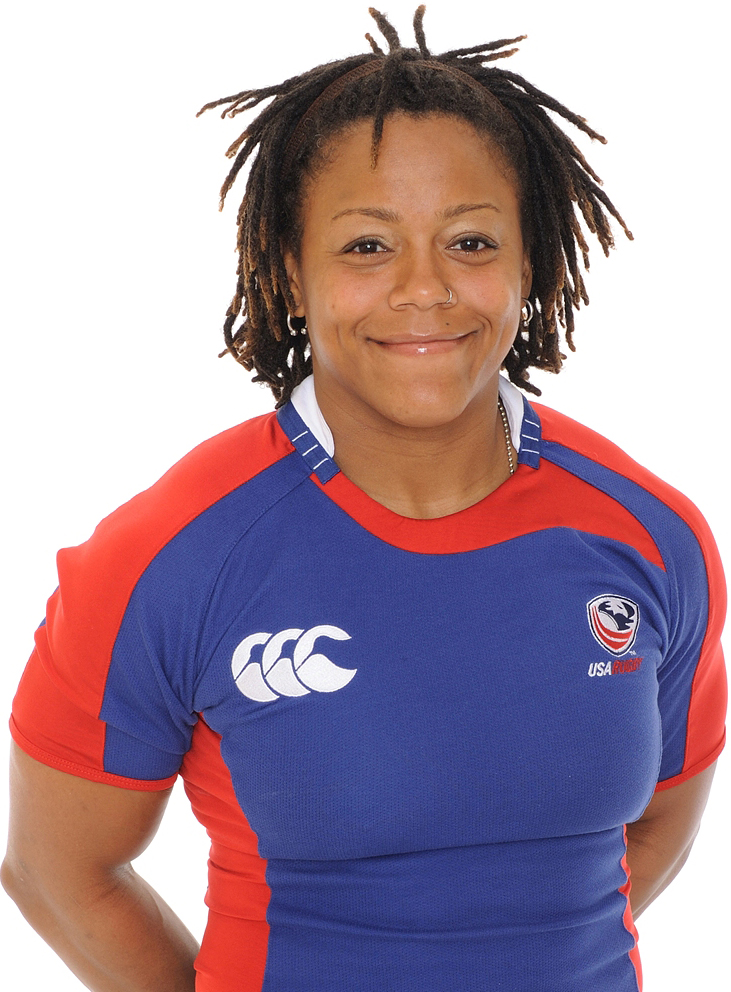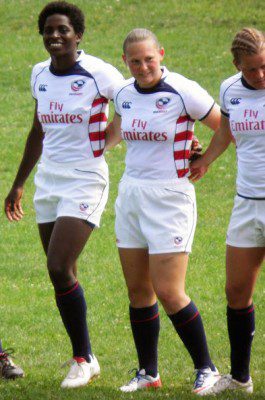
 A perennial Team USA Eagle, Phaidra Knight is one of the most recognized names in women’s rugby. Her home club is the New York Rugby Club. Today, she chats with fellow NYRC teammate and Team USA center, Rebecca Brafman.
A perennial Team USA Eagle, Phaidra Knight is one of the most recognized names in women’s rugby. Her home club is the New York Rugby Club. Today, she chats with fellow NYRC teammate and Team USA center, Rebecca Brafman.
PK: Brafman, thanks for taking the time out of your busy “doctor’s” schedule to share yourself with the fans of Rugby Wrap Up.
BRAFMAN: No problem PK, I’ve been making time for rugby in my busy schedule for many years now. It’s obviously important to me.
PK: How is life in medical school?
BRAFMAN: Hard as it is to believe, I’m actually not in medical school any more – I’m a bona-fide MD. Somehow, I managed to finish things up and graduate. I’m now a first-year E.R. residentat Mount Sinai Hospital in NYC.
PK: What was the worst thing you have seen in your work?
BRAFMAN: That depends on your definition of “worst.” There are the things you would expect, like car accidents, stabbings, and shootings, but then there are the unexpected things, like pulling a cockroach out of a patient’s ear. But you have the opportunity to play a positive role in what can be the worst day of somebody’s life.
 PK: So, tell me a little bit about how you started playing rugby.
PK: So, tell me a little bit about how you started playing rugby.
BRAFMAN: I played basketball in high school, and wanted to keep playing in college. I went to a pre-season meeting for the team at Columbia, and was dragged down to rugby practice by a couple of b-ball girls who played rugby. I was always the kind of basketball player who made good use of my full five fouls, so rugby was a good fit once I figured out the rules.
PK: Did you experience any “conflicts” with rugby and your religion?
BRAFMAN: In brief, I am Orthodox Jewish and I observe the Sabbath and keep kosher (Wikipedia it if you need a more detailed explanation). From Friday night until Saturday night, I do not travel by car or use electricity, for example. In MetNY, when I first started playing rugby, the colleges played on Sundays, so I didn’t even realize that “Saturday is rugby day” until my team needed to compete in the NRU playoffs. My first year I chose not to play, but as rugby and my team became a more significant part of my life, I realized I needed to figure out a personal compromise that would make me both comfortable and happy. I do play rugby on Saturdays but travel to away games before sundown on Friday and stay within walking distance on Saturdays. I bring Kosher food, which makes the suitcase heavy, but it’s worth it!
 PK: Speaking of Kosher, I understand that you retain the nickname “Kosher Kitty”. Please do tell why.
PK: Speaking of Kosher, I understand that you retain the nickname “Kosher Kitty”. Please do tell why.
BRAFMAN: Teammates are known to be sources of nicknames – some that stick, and some that don’t. I owe that one in particular to Tyshawn “Thunder-Tyyyy” Henry. I think the alliteration appealed to her. Personally, I prefer “Braf,” or if you want something on the more creative side, “Bearcat.”
PK: Well Bearcat, I commend your dedication to your religions—Judaism and rugby. Perfect example of making it work, folks!
BRAFMAN: I’ve always felt that life has been about balancing my priorities and dividing my time, not always evenly, on what’s important to me – rugby, Judaism, medicine, and my family and friends.
PK: You seem like a hard egg to crack when it comes to being embarrassed. What has been your most embarrassing moment in rugby?
BRAFMAN: It’s funny to see how image differs from reality. I can be embarrassed quite easily and I blush way too easily. A moment that comes to mind occurred in a spring game a couple of years ago – somebody passed me the ball to kick and I had some sort of brain fart – raising the ball over my head and throwing it forward like an in-bounds soccer throw. And I never even played soccer! Everyone pretty much stopped and just stared at me. Needless to say, it was a scrum to the other team.
PK: Speaking of rugby, you are relatively new to the USA program, correct? When did you debut?
BRAFMAN: It depends on your definition of “new.” I played for the USA U23 program in both 7s and 15s in 2004, and have been part of the USA WNT player pool since then. Unfortunately, several untimely injuries prevented me from attaining a senior-side cap until the 2011 Nation’s Cup, but now that I have three under my belt, I have the enthusiasm to put in the work to achieve some more.
PK: You recently broke your hand playing rugby at the WPL National Championships. How did that go over with work/school?
BRAFMAN: It wasn’t incredibly fortunate, but it was probably better to break my hand than my leg, or to have another ACL injury. I worked for a week with a broken hand before my surgery wearing a splint and then was in a cast for six weeks. It was my right hand too, which is my dominant hand, so I had to learn how to do a lot of things “lefty.” Some things I was able to do, like writing (though very slowly and not very neatly), and some things I had to avoid, like giving patients stitches. And there aren’t a lot of hospital gloves that fit over a cast, so sometimes I had to wear a plastic baggie to make sure that I didn’t get my cast bloody when things got messy. Working in the E.R. one-handed for six weeks makes working there with two hands seem pretty easy in comparison.
PK: Who are the 3 players that most inspire you in the game?
BRAFMAN: I always find it a bit more meaningful to gain inspiration from my teammates. Three of note (among many) would be: Michelle “Brucie” Bruce, who epitomized what it meant to be a team player, but also put on a pretty convincing show of aggression and individual determination on the pitch; Annie Collier, a level-headed and fair captain, as well as an incredibly tough competitor. I still desire to emulate her in my own role as a leader (and an E.R. MD to boot!); and Tyshawn Henry, who played all 80 minutes with a passion and an unbridled desire to dominate that is unmatched.
PK: What are 3 of the things you would encourage young, aspiring USA players to do?
 BRAFMAN: 1) You can make time for rugby in your life: A lot of women give up rugby because they think that they have to in order to pursue their career – to become a doctor, a lawyer, a business-person, or a teacher. But that’s not true. You can dedicate yourself to excellence in both if you put your mind to it and you prioritize. You might be too busy to sit around on your couch and watch a lot of TV, but hey – we all make sacrifices.
BRAFMAN: 1) You can make time for rugby in your life: A lot of women give up rugby because they think that they have to in order to pursue their career – to become a doctor, a lawyer, a business-person, or a teacher. But that’s not true. You can dedicate yourself to excellence in both if you put your mind to it and you prioritize. You might be too busy to sit around on your couch and watch a lot of TV, but hey – we all make sacrifices.
2) Find yourself some rugby models and mentors to look up to (and test yourself against):
I attended practices with the New York Rugby Club on the nights that my Columbia team didn’t have training. In 2002 NYRC was chock-full of Eagles (they sent 8 to the WRWC that year), and it was a point of pride for me to line up for sprints and drills and compete against the best. I got an “up close and personal” look at what it took to be an international rugby player, and it gave me something to strive for and to measure myself against.
3) Don’t give up: I didn’t come from a “big name” rugby school, and I persevered through several devastating injuries and a lot of selection disappointment in order to get where I am today. To quote Theodore Hertzl, “If you will it, it is no dream.” It sounds trite, but sometimes when you don’t get the support you need from the outside, it has to come from the inside.
PK: Thanks so much for your time today, Brafman. Best of luck and look forward to taking the pitch again with you..
BRAFMAN: Thank you!
P.s… Thanks to Sabrina Asch Photography and…. HAPPY ST. PATRICK’S DAY!

